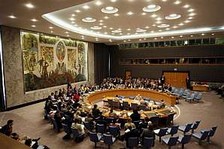"The callousness with which Libyan authorities and their hired guns are reportedly shooting live rounds of ammunition at peaceful protesters is unconscionable"
The UN Security Council on Tuesday held emergency consultations on the Libyan crisis with Western nations pressing for "swift and clear" action as Libya’s long-time ruler was vowing to remain in his country and fight to the last drop of blood.
"The scale of violence by the Libyan security forces against peaceful demonstrators is really shocking," Germany's UN Ambassador Peter Wittig said. "It has regional and international implications. That is why we think it is a case for the Security Council and the council should act with a swift and clear message," Wittig told reporters going into the meeting.
Ibrahim Dabbashi, the Libyan deputy ambassador who has called for Gaddafi to stand down and sent the letter demanding Tuesday's meeting, said "we are expecting something to protect the Libyan people" to be decided by the council.
Libya's main ambassador, Mohamed Shalgham, turned up at the Security Council late in the meeting creating some doubts about who was really representing the country.
Shalgham, who described himself as a childhood friend of Gaddafi, said he had just returned from meetings in Libya. He did not support all of the actions of his deputy but he said he had told government leaders that "violence must stop."
It was not immediately clear whether Dabbashi or Shalgham would represent Libya at the formal meeting.
The meeting comes after a string of Libyan diplomats denounced Gaddafi over his violent attempts to suppress the unrest, amid reports of warplanes and helicopters strafing civilians.
It also follows a stark warning by UN human rights monitor Navi Pillay that "widespread and systematic attacks against the civilian population may amount to crimes against humanity." Pillay, the UN rights chief, went further, saying: "The callousness with which Libyan authorities and their hired guns are reportedly shooting live rounds of ammunition at peaceful protesters is unconscionable." "I am extremely worried that lives are being lost even as I speak."
Tuesday's meeting was requested by Libya's deputy ambassador Ibrahim Dabbashi, one of several senior diplomats in the United Nations and elsewhere to have deserted Gaddafi, in power since 1969.
On Monday, UN chief Ban Ki-moon said he had urged restraint in a 40-minute conversation with the 68-year-old Gaddafi, the latest autocrat in the region to face a popular uprising after the toppling of regimes in Tunisia and Egypt.
"I urged him that the human rights and freedom of assembly and freedom of speech must be fully protected," Ban said. "I forcefully urged him to stop the violence against demonstrators and I again strongly underlined the importance of respecting human rights of those demonstrators."
Ban also issued a statement saying he was "outraged" over reports that Libyan security forces fired on demonstrators from the air. "Such attacks against civilians, if confirmed, would constitute a serious violation of international humanitarian law and would be condemned by the secretary general in the strongest terms," UN spokesman Martin Nesirky said.
